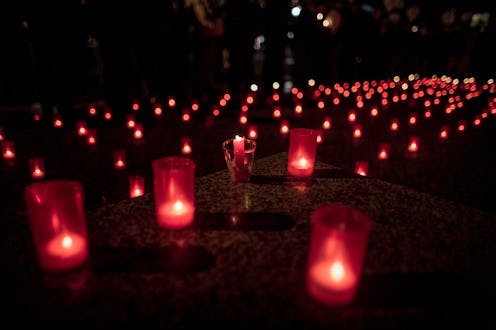News
On World AIDS Day, Here's How You Can Help
Across the world, people are donning red ribbons and clothing on Monday, Dec. 1 for World AIDS Day, which honors those who have died from HIV/AIDS and those who continue to fight the disease every day. In 1988, World AIDS Day was founded by the World Health Organization (WHO) in Geneva, Switzerland as a way to raise awareness of the disease and combat the stigma associated with it. Over the years, the day has been observed with fundraisers, walks, concerts, and educational events. The U.S. president has also given an address each World AIDS Day since 1995.
In the United States alone, over 1.2 million people are living with HIV, and 14 percent of those people are unaware they are infected. HIV destroys the cells that fight disease and infection in the human body. It's an incurable disease, but not necessarily deadly unless it destroys so many of those cells that you cannot fight off infection or disease. This is the final stage of HIV, known as AIDS, or Acquired Immunodeficiency Syndrome.
Worldwide, 35 million people live with HIV/AIDS, and 3.2 million of those are children. The disease can be contracted a lot of ways: through sexual contact; injecting drugs like heroin, pregnancy; childbirth; breast-feeding; exposure in hospitals; and rarely (but sadly) via blood transfusions from an infected individual.
Although the pandemic is at a positive "tipping point" — for the first time, the number of infected people taking life-saving drugs is outpacng the number who were infected by HIV — this day remains necessary. Misinformation regarding how the disease can be spread leads many of its sufferers to be ostracized from their communities. To contract the disease, infected body fluids must make contact with mucus membranes found in the mouth, rectum or genital openings. In other words, you almost definitely won't get HIV from kissing someone, and you certainly won't by shaking hands.
There are plenty of ways you can help researchers find a cure, or support those suffering with the disease, and not all of them require a donation.
Donate to the International HIV/AIDS Alliance
Donating is the quickest way to make a big difference. Donating to the International HIV/AIDS Alliance provides support and information for those suffering with the disease, and you can do this here.
If you want to aid research efforts specifically, you can donate to amfAR, which provides funding to scientists working in on HIV/AIDS research.
Spread correct information about HIV/AIDS
One of the biggest obstacles in the way of finding a cure and supporting those affected by HIV/AIDS is misinformation about who has the disease and how it spreads. To this day, many people believe it is spread only by those who have gay sex. While gay and bisexual men are at the highest risk for contracting HIV/AIDS, the disease affects people of all sexes, genders, and orientations.
If your wallet is looking a little bare, making a point to spread the right kind of information can make a huge difference by creating safer communities for those affected by the disease. You can find official information from the U.S. Department of Health and Human Services here.
Petition for gay men to be able to donate blood
Remember that stigma we were talking about earlier? Well, gay men in the United States still aren't allowed to donate blood, believe it or not. The federal government is pushing for this ban to be overturned, but you can help by signing a petition here.
Organize your own event
You can organize your own HIV testing day or fundraising event. For information and ideas on how to best do that, try here and here.
Images: Getty (5), Change.org, International HIV/AIDS Alliance
